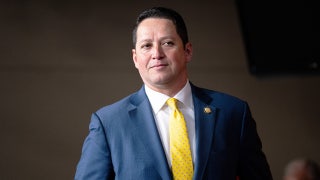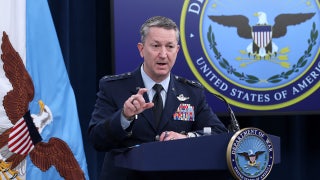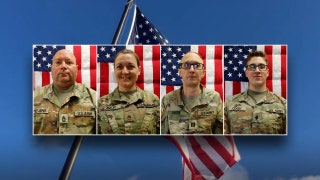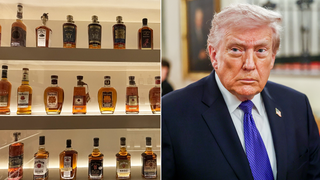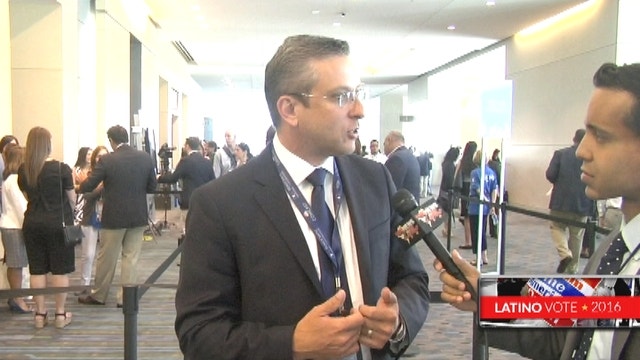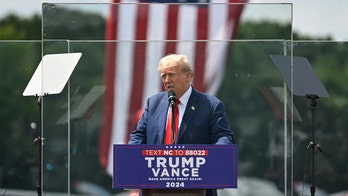Puerto Rico's governor: Supporting Trump is anti-Latino
Puerto Rican Governor Alejandro Padilla Garcia spoke to Fox News Latino from the DNC.
Philadelphia – For Norma Burgos, the time she’s spent in Philadelphia this weekend as a Puerto Rico delegate to the Democratic National Convention has been both exciting and frustrating.
Like many of her colleagues, Burgos – a former secretary of state for the U.S. territory – has happily mingled with delegates from other places, gone to events around the city and taken part in the roll calls to nominate the Democratic presidential and vice presidential nominees.
But for Burgos and several of the other delegates from the island, being at the convention has been a little like being kept behind the velvet ropes while others walk into a VIP area to which you are denied entrance.
“We participate in the Democratic Party, in the convention,” Burgos said. “I participated in the platform committee, I worked very hard to have the language of the platform [include] the right of Puerto Ricans to vote.”
She explained, “I have one son. He was a member of the Armed Forces of the United States – and I can’t vote for the president who sent him to war,” Burgos told Fox News Latino in the corridor of the Wells Fargo Center.
“I am happy that I have the opportunity to be here and participate in the democratic process,” Burgos said. “But I am also angry. I was born in Chicago, but now I live in Puerto Rico, and I don’t have the right to vote.”
She isn't the only one who feels that way.
Many of the delegates from Puerto Rico, home to 3.5 million people, were proud to have taken part in the convention that nominated the first female presidential candidate from a major political party in U.S. history, but they were also upset that their calls for statehood – and the ability to vote and have the full rights that come along with it – are being ignored by politicians on both sides of the aisle.
“I’m excited to be here, very honored,” said Charlie Rodriguez, another delegate. “But honestly, I’m disappointed. The Democratic platform says it supports the people of Puerto Rico having the right to vote, but they haven’t really supported it” by taking action.
The words ring hollow, said delegate and former Puerto Rico Gov. Carlos Romero Barceló.
“They say they support our voting for U.S. president, but we can’t do it without statehood,” he told FNL.
Rodriguez looks at other, more passionate moves by U.S. officials to help others be able to count more politically.
This year’s Democratic platform included, for the first time, support for statehood for Washington, D.C.
“We’re disappointed in the sense that D.C. is being considered for statehood, and in Puerto Rico we have 3.5 million people, more than the 700,000 people in D.C.,” Rodriguez said. “When President Obama went to Cuba and said he would like self-determination for them and for them to be able to vote, we thought ‘What about us?’”
Republicans included Puerto Rican statehood in their platform, but the delegates in Philadelphia said it amounts to little more than lip service.
Puerto Rico is currently embroiled in a decade-long recession and is $70 billion in debt. The island has also seen thousands of its residents flee to the mainland U.S. over the last few years as unemployment and crime have soared.
Earlier this month, Obama signed a rescue package for the financially strapped territory after it won passage in Congress following a lengthy battle.
The bipartisan bill was crafted after months of negotiation between Democratic and Republican lawmakers and the Obama administration. It creates an oversight board that will supervise some debt restructuring and negotiate with the island's creditors.
It temporarily blocks lawsuits by creditors and allows the island to lower the federal minimum wage for some younger workers.
"We've got to keep on working to figure out how we promote the long-term growth and sustainability that's so desperately needed down there, but the people of Puerto Rico need to know that they are not forgotten, that they are part of the American family," Obama said soon after signing the bill. "Congress's responsiveness to this issue, even though this is not a perfect bill, at least moves us in the right direction."
Despite the assistance from lawmakers in Washington, many delegates from Puerto Rico here said that they still feel like second-class citizens given their lower minimum wage, lack of protections reserved for citizens of states and, most importantly, the inability to vote for president.
“This has been a colony for more than 100 years,” Luisa de Jesus, another delegate, told FNL. “I think they owe Puerto Rico the right to become a state.”







